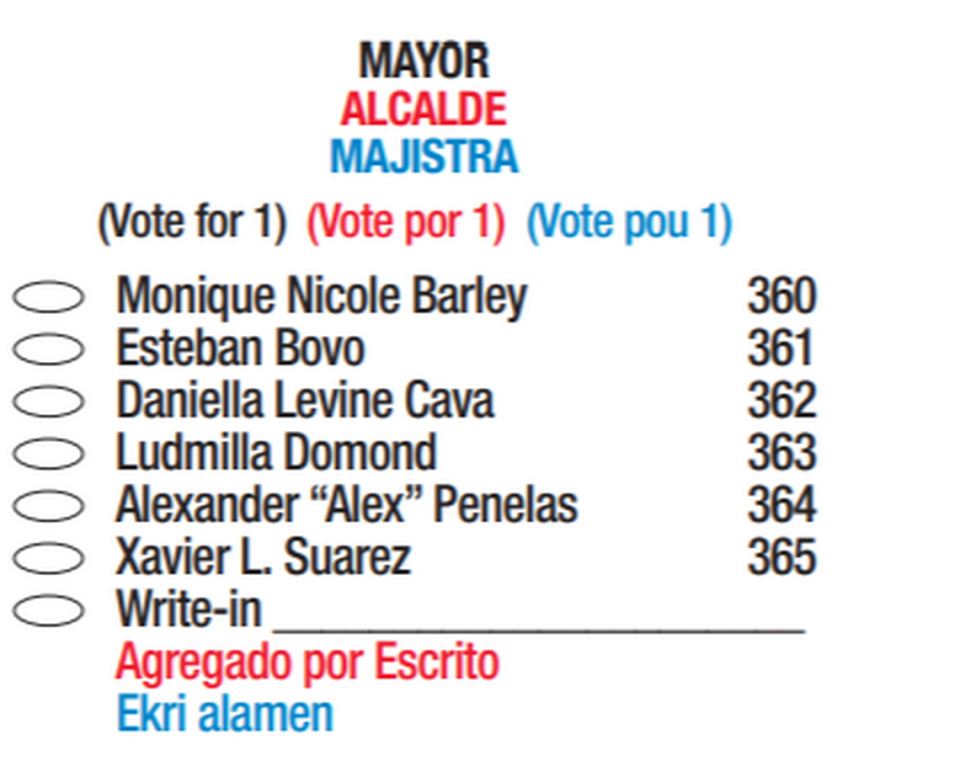A backseat connection with voters? This Uber driver is running for Miami-Dade mayor
Miami-Dade mayoral hopeful Carlos Antonio de Armas never ran for office before, has $5 in his campaign account and his name isn’t even printed on the ballot because he opted to save $2,500 on his qualifying fee by paying $300 to file as a write-in candidate.
Still, the 52-year-old can point to one advantage over his rivals: He’s driven more voters than any of them have.
“More than a year ago I started to do Uber, just to talk to people and find out what’s going on,” the Fontainebleau resident said. “When they sit in the back seat, they tell you everything. What their fears are. What they’re suffering from. What their dreams are.”
One of three first-time candidates running for mayor in 2020, de Armas didn’t pay the $2,800 needed to qualify for a slot on the ballot.
Instead, he’s the only official write-in candidate in the seven-person race, garnering a special line added in that portion of the ballot for him.
No other write-in candidates filed qualifying papers for the dozens of contests on the countywide ballot. Voters can write in other names, but the de Armas name is the only one that would be counted.

Campaign records show de Armas hasn’t raised any money, the only candidate with no recorded donations. The $305 listed in contributions came from him, and $300 of that went to the write-in fee. A filing fee for a ballot slot cost $2,800.
Born in Colombia and raised in the Baranquilla area, de Armas lived in New York before coming to Miami in 2005. His ex-wife was a U.S. citizen, and they have three children, ages 10, 12 and 14. De Armas said they share custody. “I cannot survive without my children,” he said.
Florida International University said de Armas earned a master’s of International Business there in 2015. While he’s owned a trucking company and worked in banking, he’s now living off savings while relying on Uber for new income.
His campaign disclosure form lists a negative net worth due to a lack of assets beyond a new Toyota Camry and more than $100,000 in student debt, credit card bills and an auto note. “We’re surviving,” he said.
Like Monique Barley and Ludmilla Domond, the other two rookie candidates in the race, de Armas uses his lack of political experience as a selling point.
“I am the voice of those without voices,” he said during a recent interview. Pointing to the millions raised in the race by county commissioners Esteban “Steve” Bovo Jr., Daniella Levine Cava and Xavier Suarez and former mayor Alex Penelas, de Armas said his lack of money leaves him independent. “They all have owners,” he said.
De Armas said he started driving for Uber about a year ago and, according to his Uber app, completed 4,456 trips since then. He hands out De Armas for Mayor cards to passengers with his cellphone number, write-in instructions and “Be The Change!” slogan. He said the cards tend to spark conversation on county government.
He recalled a discussion on the value of voting when driving two men to recent racial-justice protests in Miami, and being surprised to learn from a construction worker who got charged for meals during a stint behind bars. Miami-Dade jails charge $2 a day.
“This is something I didn’t know,” he said.
Campaigning while driving for Uber does not seem to violate corporate rules, but a company spokesman suggested it could put a driver at risk of annoying passengers.
“Directly related to a driver potentially campaigning on the platform, keep in mind that riders rate drivers after each trip and a driver can lose access to driving on the platform based on their rating and feedback from riders,” said Javier Correoso, an Uber spokesman for the Miami market.
De Armas said his Uber campaigning has been a good experience. A screenshot of his Uber app shows him with an admirable 4.93 rating and an internal Diamond ranking, the highest for drivers.. He’s still driving during early voting in advance of the Aug. 18 primary, and he related a recent sign of momentum.
“Yesterday, I gave my card to someone,” he recalled in a recent interview. “She said: ‘I already voted for you.’ ”

